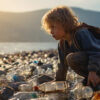Water knows no regional borders, race, or religion. All living beings on the planet, without distinction, depend on quality water being available.
This forceful (and also obvious) statement is at direct odds with the following reality: 2.2 billion people in the world lack access to safely managed drinking water services, and over half of the population does not have adequate sanitation services. What is more, 2 billion live in countries suffering from water scarcity.
Fortunately, an increasing number of organisations are working on projects that aim to find solutions for these problems.
At a worldwide scale, UN-Water is responsible for coordinating the work of over 30 United Nations organisations that work on programmes related to water and sanitation. It is also a tracking centre that provides coherent and reliable data and information on key water trends and management issues throughout the course of the water cycle.
Countries cooperate by sharing technology and solutions through a shared programme, Water Action Decade 2018-2028, to transform how we manage water, improve its quality, and achieve access to sanitation and hygiene services for all. To obtain faster and higher-scale results, in 2020, the United Nations launched the SDG 5 Global Acceleration Framework as part of the Decade. This is an initiative that revolves around five inter-dependent “accelerators:” mobilising funding to support national plans, collecting data to take action and measure reliably, developing capacities for better management, innovation, and governance to facilitate cross-border cooperation.
Internationally, where voluntary cooperation is prioritised over imposition, conferences to reinforce collaboration between countries are especially important. Regarding water, the UN Water Conference to seek solutions to the hydric pressure the world is currently suffering was held in 2023. During this conference, 300 billion dollars were committed to drive an agenda with almost 700 commitments, ranging from “capacity creation and data and tracking systems to improved infrastructure resilience.”
Unlike the international sphere, the European Union water policy sets the goals, guidelines, and standards that the 27 Member States must implement in our regions. In this part of the world, over 90% of wastewater is processed according to European standards. Notwithstanding, the EU has an important challenge to guarantee the quality of aquifers and to improve the ecological state of lakes, rivers, estuaries, and coastal waters.
Below, we provide two cases that are representative of shared collaboration and work between countries and organisations.
One of them is the Great Green Wall project, launched by the African Union to fight the impact of environmental degradation and desertification. It consists of reforesting the southern Sahara desert, along a swath occupying an extension 7,000 km long and 15 km wide, with the participation of 20 African countries in total.
Despite how complicated it is to execute the project, and how difficult it is to do this in so many different countries, this is a strategic project that is strongly driven by the United Nations. It boasts the support of the International Community and the European Union.
Another significant case is the Senegal River Basin project. The Senegal River Basin Development Authority was created in 1972, and currently comprises Mali, Senegal, Mauritania, and Guinea. River management assigns cost percentages based on the benefits that countries can obtain from different uses, like irrigation, energy, and water transport. Thanks to their cooperation, these countries have achieved a sustainable solution to the benefit of all.
When organisations and countries cooperate with the shared goal of tackling global water challenges, it creates a waterfall effect to improve the baseline situation, facilitate adaptation to change, and generate wealth.






